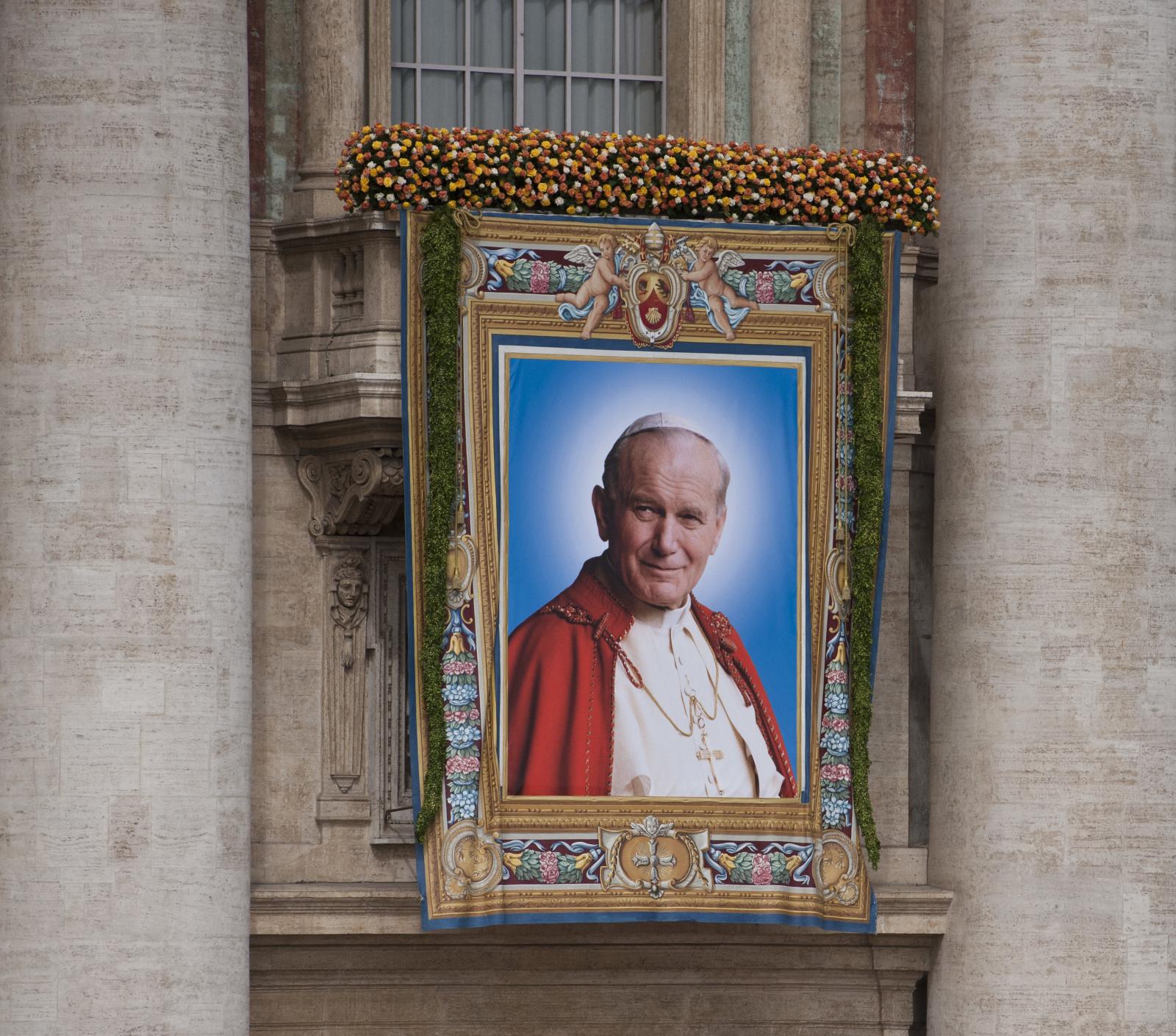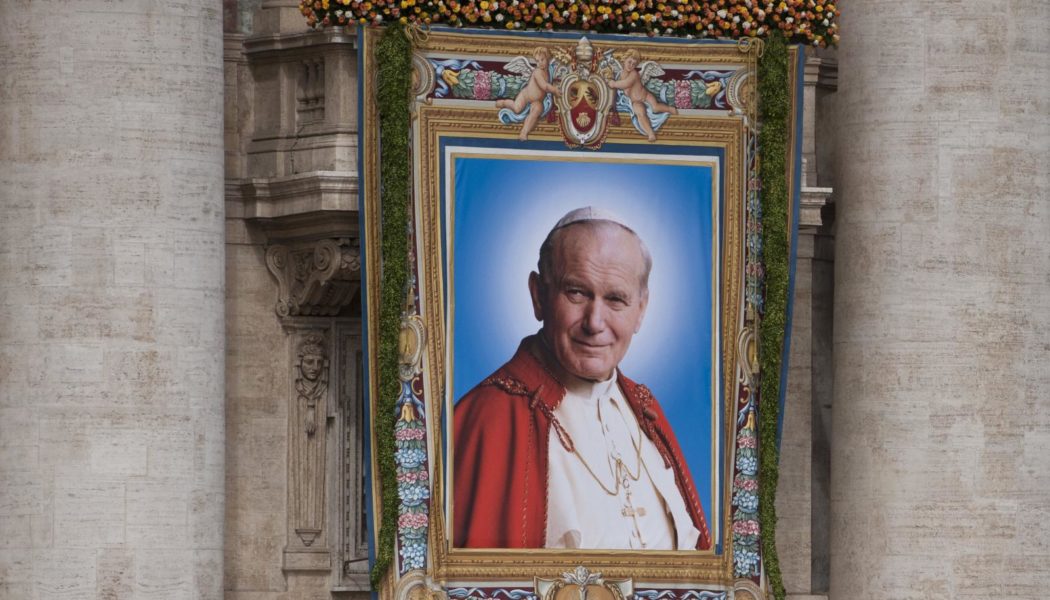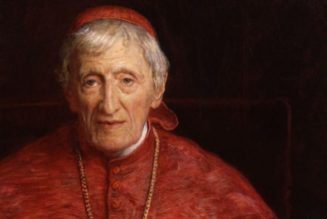
By Fr Hugh Mackenzie
St John Paul II is widely accepted as having made a major contribution to the 1989 downfall of the Soviet regime. For him this was the victory of the Christian vision of the human person over the Marxist one. The truth about Man ‘will out’ as long as we are ‘not afraid’ to live and teach it. This was the vision he courageously preached to the people of his native Poland, from the post-war pulpits of Krakow, the 1950’s lecture halls of Lublin university, through to the massive papal stages of his 1979 and 1983 pastoral visits to the land which formed him.
Person as rooted in Word and Work
In 1941, aged 21, during the Nazi reign of terror over Krakow, he helped found the ‘Rhapsodic Theatre’. This was building upon the tradition of the long-suffering Polish people of reciting freedom poetry as a way of resisting alien domination. For as he wrote later, through the spoken word:
‘Man, an actor and a listener-spectator alike… [grasps] his inner, spiritual nature’
[Drama of Word and Gesture, 1957].
It is similar with manual labour, as he discovered from his 1942 hewing of stone at a chemical works outside Krakow. His own poem A Quarry reflects with compassion upon the difficult life experience of a colleague killed by dynamited stone. He poignantly meditates upon ‘anger’ at injustice, ‘a sense of wrong… maturing in him through his own truth and love’. It ends:
‘But the man has taken with him the world’s inner structure,
where the greater the anger, the higher the explosion of love.’
His 1980 encyclical Laborems Exercens would draw out the dignity of labour as rooted in the labourer’s creativity. Human work is therefore more important than financial capital. This thought inspired the formation of the famous Polish Trades Union Solidarity, crucial as this was to the fall of the Berlin Wall.
Person as Called to Self-Gift
Into this reflection upon human action in word and work came a third, more overarching theme; that of “gift”. During tea-breaks in the quarry, Wojtyla was reading the mystical writings of St John of the Cross, imbibing the latter’s striking description of the mutual self-giving between God and the soul that takes place in the human subject’s experience in prayer. A 1957 poem of his, Actor, begins:
‘So many grew around me, through me,
from my self, as it were.
I became a channel, unleashing a force
called man. ‘
Wojtyla’s PhD thesis, completed in the late 1940s under the great Garrigou-Lagrange in Rome, sought a certain synthesis of the ‘internalism’ of St John of the Cross and the ‘externalism’ of St Thomas Aquinas. The former’s description of the human subject living life to the full was seen as a necessary enrichment of the latter’s description of the human person as an objective union of body and soul called to exercise virtue. Back in Krakow, in the early 50s, he penned a further thesis comparing such enrichment with Max Scheler’s description of the human person as fundamentally ethical and oriented to ‘mutual gift’.
His late-1960s book, The Acting Person (Ozoba I Cyn), developed such thinking into a philosophy of human experience (a ‘phenomenology’). In this he developed the idea of the person finding meaning and fulfilment through generous, creative action.
Grounding the New Evangelisation
Cardinal Wojtyla expressed the hope that such intellectual grafting of the acting subject onto the Catholic ‘Realist’ tradition might ‘contribute to the disentangling of the conflicting issues facing Man, which are crucial for Man’s own clarification of his existence and direction of his conduct’. In 1975 he wrote:
‘the category of lived experience must be at the centre of anthropology and ethics… depicting the authentic personal subjectivity of the human being in the realistic interpretation of human existence …
‘This is what the contemporary philosophy of the subject seems to be telling the traditional philosophy of the object. … disclosing this reality can only enrich and deepen the whole realism of the conception of the human being.’
[Subjectivity and the Irreducible in the Human Being, 4-6]
As he put it twenty years later in his first encyclical:
‘Man… is the primary and fundamental way for the Church, the way traced out by Christ himself, the way that leads invariably through the mystery of the Incarnation and the Redemption.’
[Redemptoris Hominis 13]
After the Iron Curtain had fallen, the sainted Pope thought that our western humanist ‘culture of death’ might gain from such a vision of the human person. His ‘Theology of the Body’ applied the ‘person as gift’ thought to rescuing the West from its hedonistic experiment.
In 1998 he issued the encyclical Fides et Ratio in which he highlighted the ‘urgent’ need for a better synthesis between modern reflection upon subjective experience and objective Thomistic metaphysics:
‘We face a great challenge… to move from phenomenon to foundation, a step as necessary as it is urgent… if experience does reveal the human being’s interiority and spirituality, speculative thinking must penetrate to the spiritual core and the ground from which it rises.… If I insist so strongly on the metaphysical element, it is because I am convinced that it is the path to be taken in order… to correct certain mistaken modes of behaviour now widespread in our society.’
[Fides et Ratio 1998, n. 83]
Humanistic individualism has proved a harder nut to crack than Communism. But like Wojtyla under four decades of the latter, let’s stay confident that the Christian vision of Man is better.







